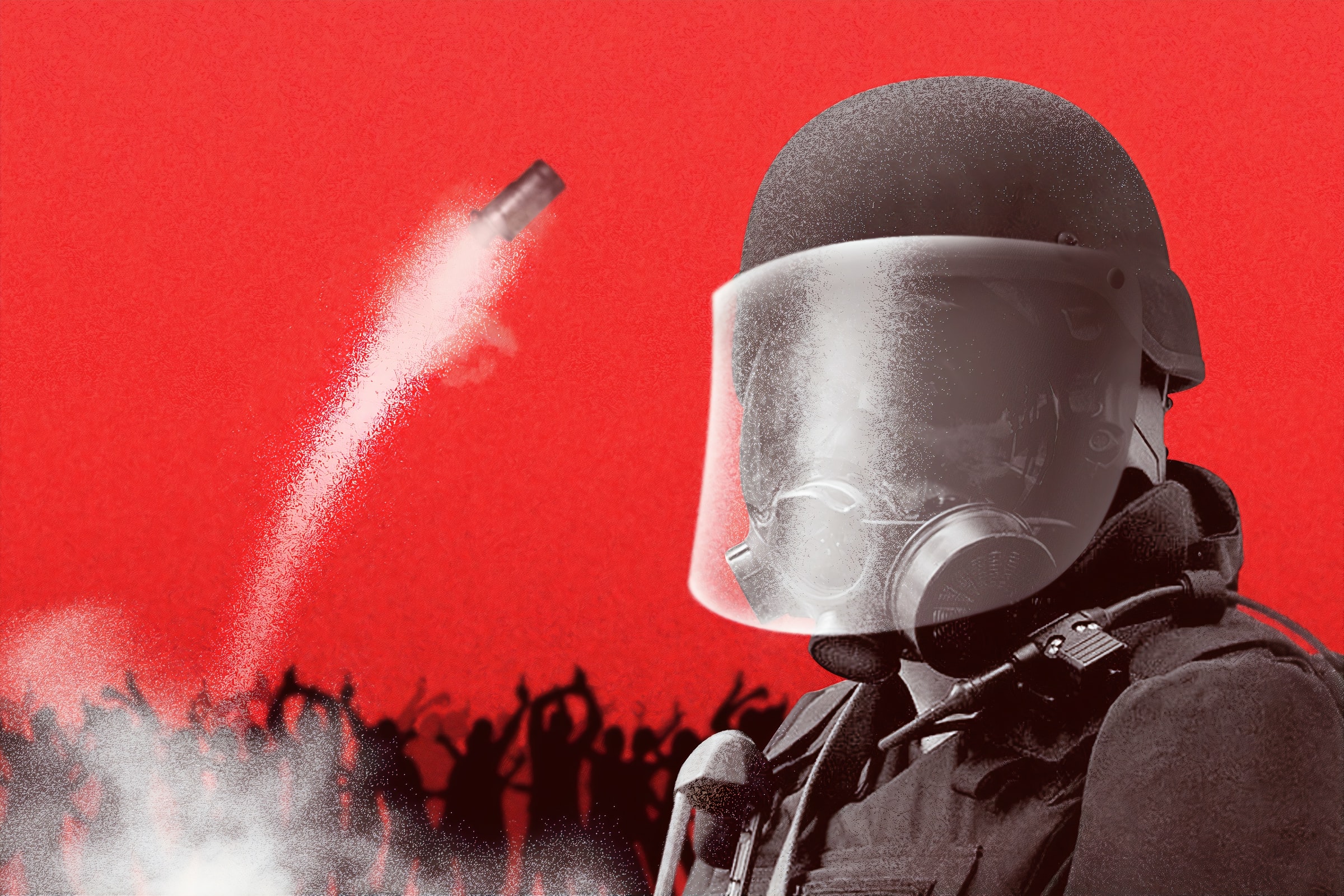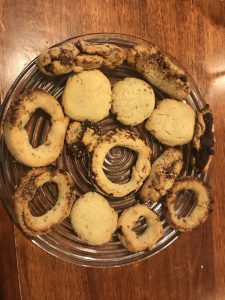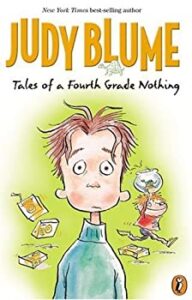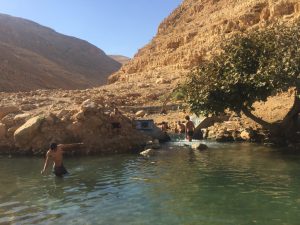I went for a morning run with my son in a stroller and felt my eyes and throat burn. Tear gas thrown by Israeli soldiers.
“Aaaaaaahhhhhh!” Adam’s voice. I heard Osama trying to calm him down. 5:20 am. Adam was not going back to sleep at this point, and anyway I was late to leave for a run, if I wanted to get the children to daycare and kindergarten on time. The fear that Adam would wake his sister, Forat, got me out of bed quickly.
“Here’s Ima,” Osama promised, and the crying stopped. Half asleep, I took Adam in my arms. I tried to suppress a wave of frustration and anger. I wanted to make a cup of coffee. I wanted to get dressed without holding a two-year old child, weighing twelve kilograms, in my arms. I wanted ten minutes to myself.
I managed to get dressed while holding Adam. When I tried to drink coffee, he cried and pulled on my shirt, wanting to nurse. If he wakes Forat, I won’t be able to run. Full of self-pity, I almost threw him into the jogging stroller.
“For God’s sake! Give me a minute!” Adam cried louder.
“Relax,” Osama said, worried. I stepped into the hallway barefoot, with Adam in the stroller. I held my running shoes in one hand and in the other hand the cup of coffee that I really didn’t want to give up. I entered the elevator quickly, so that Adam’s crying wouldn’t wake the neighbors.
Outdoors, Adam immediately calmed down. He looked at the quiet street, anticipating the relaxing movement of the run and our time together. It was 5:45 am, October, just before the change of the clock from daylight savings time. Stars and a half moon sparkled in the sky. There was an intoxicating scent of “laylat ilkader”, a flower similar to jasmine whose name comes from the night near the end of the Muslim holy month of Ramadan, during which the devout pray until the dawn.
I touched Adam’s cheek gently. “Hey,” I said. “I’m sorry.” He smiled, and his black eyes shone.
I put on my socks and shoes and buckled Adam. I put the empty coffee mug underneath the tree near the entrance to the building. I turned up the street that leads from our apartment to the main road above, my face close to the handle of the stroller, running at a nearly ninety degree angle.
At the top of the hill, across from the pharmacy and mobile phone store, I stopped to breathe. I looked to my left, toward the traffic circle. I saw jeeps and men in uniform. Palestinian police? I tried to read the license plates under the light of the street lamps. One of the men turned his head in my direction, a hundred meters away. I could no longer deny that he was an Israeli soldier. The army makes nightly incursions into Ramallah, as well, usually to arrest people. But why now, so late in the morning?
Frightened, I made a sharp right turn and pushed Adam forward in the stroller as hard as I could. I ran two hundred meters and suddenly felt burning in my throat and eyes. Tear gas. Apparently from the main road above us. Adam.
I reversed direction, having no choice but to sprint toward the soldiers. Before reaching the traffic circle, I turned left, back toward our building. The stroller skipped on the too-fast downhill. My eyes burned and teared. Adam.
I stopped in front of our building. I looked at Adam. His face was serene, and he smiled a shy smile, showing me both of his dimples. I didn’t see signs of tears or mucus. He wasn’t coughing. Maybe I inhaled a dose of the gas because I was breathing heavily, while Adam took shallow breaths? Or the stroller’s sun cover blocked the blowing of the gas?
I tried to steady my breathing. It was quiet, two hundred meters from the traffic circle where the soldiers had set up camp. My heart raced. Adam looked at me, sleepy, waiting for our run to continue. I didn’t want to go back home. I wanted to dissipate the fear and tension with intense physical activity. Above, on the main road, God knew what was happening. Below, on the steep descent into the wadi, it was too dark, and it would be hard to control the stroller. Also –the soldiers might leave the city that way. The sky began to lighten in shades of pink and orange. I took a deep breath – the air was clean – and began to run with Adam back and forth on a side street below the traffic circle. He fell asleep. A half hour later, I dared look at the circle and saw that the soldiers had gone. Drivers came out of the taxi stand and rushed to their first rides of the morning. A young woman, dressed in tight jeans and wearing a hijab, got into a public taxi. I went home.
“Good morning, habibi!” Osama called to Adam, who awoke as we entered the apartment. Forat was eating oatmeal. When I unbuckled him, Adam climbed out of the stroller and sat on Osama’s lap.
Later, a news report said that solders had again raided the home of Samer Arbid, a suspect in the explosive attack near the settlement of Dolev that killed 17-year old Rina Shnerb. Arbid was tortured by his Shin Bet interrogators and arrived at the hospital in critical condition, but had since recovered and was expected to resume being interrogated. The soldiers apparently fired the tear gas at demonstrators protesting the raid.
I told a friend from the neighborhood what had happened.
“But that happens a lot, that they are still here during the day,” said Isra’a, mother of nine-year old Sara. “A few months ago, for example, we saw them on the road to Beitunia at nine in the morning. Sara was really scared.”
Michael, my friend from Tel Aviv, laughed at me on the telephone: “When will you stop running already?” And then, more serious: “Are you sure you want to live there?”
His question was rhetorical. He knew the Israeli authorities would not let Osama move to Israel, even if we wanted to live there. But there was something else I wanted to say to him in response, only I didn’t know how. In the bubble of Tel Aviv – which in some ways is very similar to Ramallah – the feeling of safety is also an illusion. Middle-class residents of both cities enjoy a good life, obsessing over the details of the newest coffee shop, going to a film or play, and weaving English words into their sentences, because, after all, they are cosmopolitan. They ignore, or at least try to ignore, the darker sides of their lives, such as the huge gaps between rich and poor in the city and the occupation that sends its tentacles deep into both places.
Itamar, Michael’s son, is two and a half years old. When he turns 18, he will most likely be drafted into the Israeli army. Maybe he will be sent to man checkpoints or to make nightly arrests. My parental challenge was to protect Adam from inhaling tear gas in a quiet residential neighborhood, as he sat in a jogging stroller. Michael’s challenge will be to prevent Itamar from firing tear gas canisters on such a neighborhood, in which children are riding in jogging strollers, if and when Itamar is told to do so. Or maybe Michael will have to support his son, after he does something like that.
At night, I pulled Adam close to me in his bed. “Havi,” he whispered. Halavi – a child’s word for milk.
I breastfed him. When he grows up, he will not be handed a gun and sent to maintain the occupation. At least I managed to protect him from that.
This post was also published on haaretz.com on February 27, 2020:



